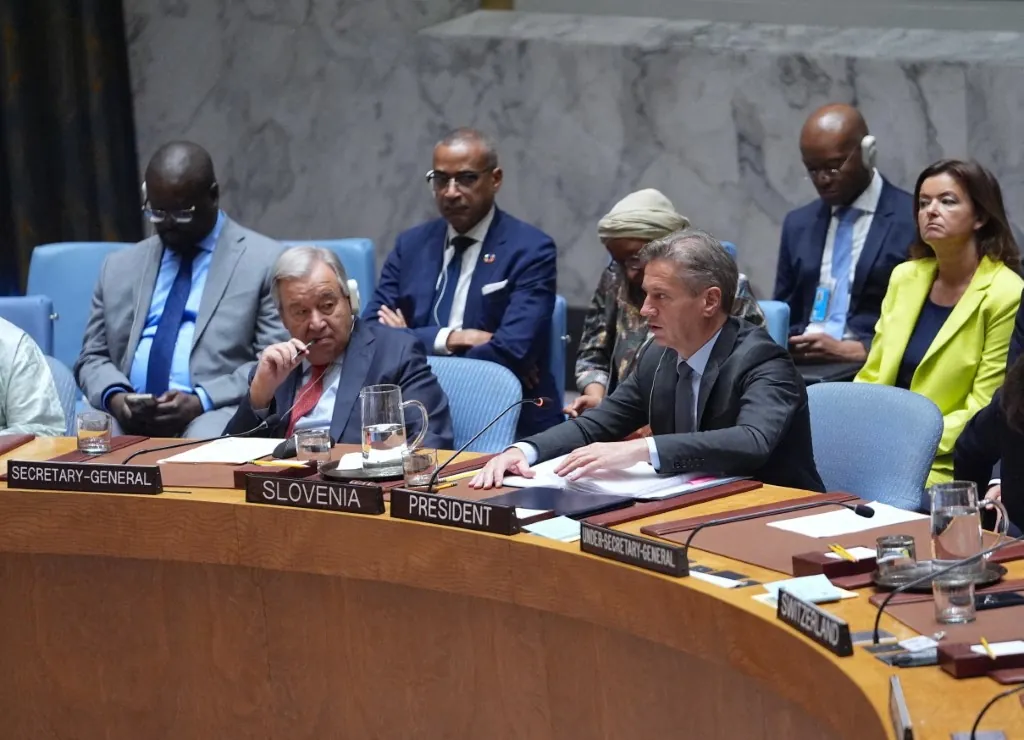“The Slovenian government is not the guardian of international law,” reads the Israeli response to Slovenia’s demarche regarding recent developments in Lebanon. The demarche, which our editorial office managed to obtain, also states that they regret “the unilateral and hostile statements made by Slovenian officials, in particular by the Slovenian Prime Minister and Foreign Minister.”
In this document, the Israelis are not merely reacting to Slovenia’s positions expressed at the United Nations Security Council, as Prime Minister Robert Golob‘s performance at the start of the 79th UN General Assembly did not go unnoticed either. Namely, in his speech, Golob directly called on Israeli Prime Minister Benjamin Netanyahu to end the war and – bizarrely – to release the hostages, even though the hostages are being held captive by Hamas, which is also the culprit for the war.
Slovenia, however, called for maximum restraint in light of the escalation of relations between Israel and Hezbollah a few days ago in order to prevent further regional escalation. “Civilians on all sides and humanitarian workers must be protected at all costs. We reiterate our call for the full implementation of Resolution 1701,” the official profile of the Slovenian Foreign Ministry on the social network X highlighted.
The response, which was written in Jerusalem, reads that Israel remains fully committed to Resolution 1701. “Unfortunately, however, we have experienced serious violations by Hezbollah, which is supported by the Iranian regime, along our northern border over the past year. Attacks on Israeli civilians have gone unchallenged by the international community,” they explain.
Hezbollah’s acts of aggression threaten Israeli sovereignty and civilians
The Israelis go on to explain that today, Lebanon is under the control of a terrorist organisation – Hezbollah – which acts as an extension of the Iranian regime. “This reality makes Lebanon a failed state that is incapable of respecting international law or of maintaining sovereignty over its territory,” they explain, adding that Israel therefore has “no choice but to defend itself against these repeated acts of aggression by Hezbollah, which threaten Israeli sovereignty and civilians”.
They point out that Israel is fighting a defensive war on several fronts. “The reason we have not suffered many civilian casualties in the north is due to our advanced defence systems and the evacuation of 60,000 people from the area attacked by Hezbollah,” they explain, adding that if rockets fired at Israel had reached their targets, the consequences for Israeli lives and property would have been catastrophic and exponentially greater, as Israel is being targeted on seven fronts. “This underlines the need for continued Israeli military operations to eliminate the terrorist threat – not only for Israel’s security, but also for regional stability, which also benefits European countries, including Slovenia,” they believe.
“The Slovenian government is not the guardian of international law. However, it should be stressed that Israel respects international law and that the IDF (Israel Defence Forces) is making enormous efforts to protect civilians to the fullest extent possible and to target Hezbollah-linked targets,” they added, pointing out that Hezbollah, on the other hand, “indiscriminately attacks Israeli territory with uncontrolled rockets and other weapons, largely supplied by Iran, and has no desire to follow international law.”
“The title of your document – “A demarche on the latest situation in Lebanon” – reflects an unbalanced approach that fails to recognise the serious situation in Israel and the enormous material and economic damage, and, above all, the loss of life and injuries to many Israeli civilians,” Jerusalem believes. They also drew attention to the fact that “Israel maintained an eleven-month restraint during this period, which was more than enough, but was completely ignored, despite constant diplomatic attempts that failed again and again.”
Outraged by Golob’s speech
They say they are even more saddened by the fact that the Slovenian document does not mention the 101 Israeli hostages still held by Hamas in Gaza. “It is absurd that Prime Minister Golob did not seem to know this in his speech at the 79th UN General Assembly on the 27th of September, when he called on the Israeli government to release the hostages,” they criticised, explaining that a ceasefire “can only be discussed when this serious violation of international law is addressed, and the hostages are released.” “Ignoring this aspect of the conflict not only undermines the credibility of any ceasefire proposal, but also ignores the humanitarian aspects related to these innocent victims and casts renewed doubt on the impartiality and seriousness of Slovenia’s calls for peace,” they stressed.
“Finally, we deplore the unilateral and hostile statements made by Slovenian officials, in particular by the Slovenian Prime Minister and Foreign Minister. This demarche was also issued without first entering into dialogue with our Ambassador,” the Israelis criticised, saying that it is unusual for such a complex and important issue to be discussed in the media and at press conferences. “Such actions do not contribute to fostering a constructive and respectful atmosphere and, of course, show a lack of knowledge of the so-called ‘Israeli intentions’ stated in your letter,” they argue. Finally, they expressed their hope for “much greater balance and diplomacy in future interactions” adding that they hope “that the Slovenian government will choose a more nuanced approach in future dealings with these complex issues.”
Ž. N.


